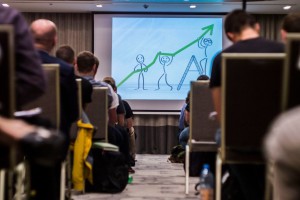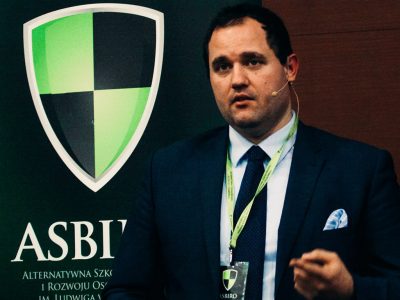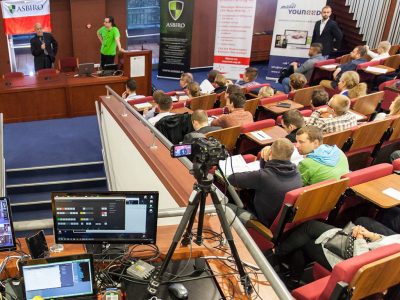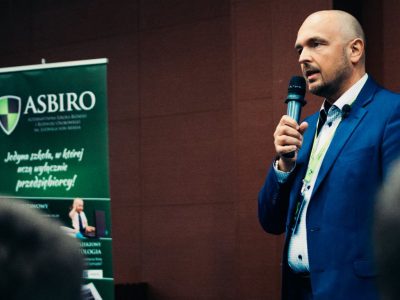Can you remember the first weeks and months of running your company? Dreaming of becoming yet another revolutionary entrepreneur, the like of Richard Branson? Struggling with fears of an uncertain future while dreaming about a great business at the same time? A number of ASBIRO students are at this very stage: they want to start, so they are studying and struggling with enormous uncertainty. Others have already succeeded. Some have done it the first time round, others have succeeded the tenth time round, there are also those who have given up and gone back to their full time jobs. A considerable number are already running several dozen strong companies and thinking of continuing their expansion, although they do not necessarily know how to do that.
What can you do to start your business project up effectively and how can you find partners to assist in developing your company? Learn the stories of people who have started from scratch to achieve international success. Meet people who have created and sold over a dozen companies already. Take advantage of the experience of those who have found partners, associates and investors.
Where and when?
Cardinal Stefan Wyszyński University (UKSF) in Warsaw, ul. Wóycickiego 1/3, Robert Schuman Hall, Building 21 on March 19-20. (see map)
Where did the idea for the seminar come from?
The full house during the first seminar on start-ups, organised by ASBIRO in May 2014 (“From small to big”), made us realise how much our students and supporters need this subject. The event was attended by entrepreneurs, as well as full time employees, whose financial potential makes them ready to invest in new companies. Our lecturers also encompassed people who had built their companies from scratch, but the scale of operations made them need assistance of partners and investors. This seminar evidenced that you do not need to be an entrepreneur to be involved and earn like one!
Five years ago, the Polish startup ecosystem was still quite small. In fact, it was almost invisible, and the idea that Poland could become a startup power was rather abstract. But now it’s completely different! The momentum with which the ecosystem is currently growing is incredible.
ASBIRO supports start-ups
Since the very beginning of ASBIRO our objective has been offering support to young entrepreneurs taking the first steps on their business path. It turned out that our students have found considerable reassurance in being a part of a community that thinks in entrepreneurial terms and at the same time builds a platform to exchange experience with people with several, or even several dozen years of business experience. It has been within the framework of ASBIRO courses that successive business projects have emerged, initiated by our students, and some of them have also attracted partners and investors in the circles of ASBIRO associates.
A watershed year for the ASBIRO start-up community
This academic year is a watershed for us, as in June the students of the first edition of the Extended Programme will present their business plans to investors as part of their BA exam. Looking at their business ideas we can already identify great capacity and the potential to win valuable mentors and financing for projects initiated within our University.
The reasons for the success of all these projects can be seen not only in the valuable and substantive lectures our students attend, but also (or rather primarily) in the networking opportunities provided by our University. Our years of experience in running courses and organising trips have made us realise that the best ideas do not only originate during lectures, but also during informal evening meetings of both students and lecturers.
Poland possesses all the resources to allow it to become an affluent region. We have more engineers than France and Germany combined. We are one of a few countries with more IT experts than there are jobs for them. People are hard-working, ambitious and motivated. Unlike West Europeans, Poles are ambitious and not used to living at the expense of the State. They do not count on social care, and when they cannot find work domestically, they look for employment abroad. The population boom of the martial law period is at the most productive stage of its life. We have a good location, we are in the proximity of developed economies, and we have access to the sea and huge natural resources. Why isn’t Poland the Hong Kong of Europe yet?
The start-ups in Poland
Every day, around 1,000 new companies are registered in Poland. In theory, each one can be labelled a start-up, if it offers an innovative approach to its product or service. Innovation is not the exclusive domain of the IT industry, because every kind of improvement in the functioning of a company, whether traditional or not, is innovative. What are Polish companies doing then in order to be innovative and deserve the start-up label?
It turns out that some 50% of start-ups in the IT industry declare that their projects are related to new solutions on a global scale, and the remaining ones either create solutions focused on the local market or imitate already existing projects. What can be done then to expand the scale of our operations as much as possible and open up to foreign markets? Is it true that the local market offers no opportunities for development? What can be done to protect our ‘brilliant idea’ from ending up like most start-ups do, and to begin to achieve our business goals?
Building an innovative industry, such as one based on IT, is not the idea of what is called the start-up industry, but the foundation of Poland’s development in the years to come.

What do Polish start-ups need most?
It will come as no surprise that most start-ups founded in Poland indicate money as their most urgent need. While around 60% of company owners employ their own resources at the beginning, they frequently are not able to meet the needs of their projects’ potential. Where are they to turn to find sources of financing, and what conditions need to be fulfilled in order for their project to be appreciated by potential investors?
Money is not everything, however, as Polish start-up founders mention the need to build a strong team and an extensive network of contacts as well. How can newly established initiatives build teams, and where to look for the most valuable workers, who will passionately commit themselves to developing the project? And how to expand networks of contacts and reach investors, as well as associates and mentors who would be able to share their experience in order to enhance projects and assist in developing even more dynamically?
How do you finance your idea?
Your company may be developing effectively, but after an efficient beginning and achieving your goals, you cannot move on without an additional source of finance. What financing sources are worth using to give your company even more impetus? Although over three quarters of start-ups intend to develop on the basis of their sales profits, not every project can afford to do so. Running sales are frequently not able to finance the activities that are indispensable for your project to become a breakthrough. Some look for investors, others count on strategic business partners. Typically, entrepreneurs are not able to develop their projects in a continuous and efficient manner, solely on the basis of their own resources. It is most advisable, then, to approach individuals and institutions that want to assist us counting on adequate returns. Where to find such individuals? How to convince investors about your project? What is most important for investment funds when choosing projects? What mistakes do start-ups typically make when seeking financing?
Meet the authors of success stories
In organising our seminar on start-ups, we invited people who had succeeded in building, developing and selling several businesses. Other lecturers are people whose projects you are most likely to be familiar with. You will have an opportunity to learn their history and the reasons why their companies develop dynamically. The speakers will also share their experiences on seeking investors and building relations with them. Thanks to their stories, and unique experience, every seminar participant will be able to learn what needs to be done to build a company, on the one hand, and, on the other, how to develop it to the stage where it is no problem to sell the entire project.
We will meet Ian Davidson, among others, who has sold over a dozen technical businesses to such buyers as Cisco and Lucent. It was one of Ian’s companies that set the standard for fax machines in terms of frequencies and coding. Those of us who used to use analogue modems might have had the equipment manufactured by Ian’s company inside their computers. All these projects have made Ian a billionaire, and he is coming in March to share his experience and answer the questions that are nagging us. Do you know already what questions you will ask Ian?
Another seminar lecturer from abroad is John Chisholm. You can already get a taste for what we can expect to see in March 2016!
Take part in low-key workshops with John Chisholm
There is even more to the weekend of lectures we have designed for you! Especially with the people associated with ASBIRO in mind, we have requested John to come early and run a closed, low-key workshop for a group of twenty people who want to implement new business projects. John Chisholm is the author of Unleash Your Inner Company, a book with a 100% five-stars rating on Amazon!
John Chisholm is running this closed workshop in Warsaw on 17-18 March, 2016 (the workshop will be conducted exclusively in English and recorded).
Why are we organising a seminar on start-ups?
The community that emerged within ASBIRO has an incredible capacity. We keep hearing about new projects drawn up by our students from different courses who were initially dealing with completely different business areas than now! Knowing the greatest challenges faced by start-up initiatives we want to provide our students with the maximum range of tools that will allow them to considerably increase the success of their project, starting with the idea, to the business model and presenting their business plan to investors, to financing and selling their start-up. We want to give you everything that will allow you to start from scratch and make the idea germinating today become a profitable reality.
Our story started at a local meeting of the ASBIRO club in Wrocław. I met Bartek there. For some time we were exchanging and discussing different ideas for a start-up. Eventually, Bartek came up with an idea for an application for tracking website changes. I liked this idea. I could see it being applied by my own company and by others. We were joined by Michał, Bartek’s acquaintance from the MBA Entrepreneurship programme. Together we founded deltado.com, which transformed into an application for monitoring competitors on the Internet.
When is this event taking place?
The “Time to start up” seminar is going to be held on 19-20 March at ASBIRO.
During the seminar you will learn how to use the potential of your idea to the maximum and you will learn what paths our lecturers have taken in implementing their start-up ideas. Some of their businesses have been sold for millions of dollars! Thanks to their experience, you will learn every detail of the road you need to take to succeed, while getting the tools that will allow you to implement your project effectively.
This is what the last seminars were like
Below you can see short accounts of our latest seminars: “How to find and retain valuable workers,” and our winter seminar “Business and family.” Our seminars fill up lecture rooms, and we are frequently forced to close registration early.

We recommend our YouTube channel. We have posted more materials on ASBIRO there. You can see accounts from our events there, a report on the construction of a school in Africa, and a few more lectures we have posted in full.
What will the “Time to start up” seminar look like?
Taking part in the “Time to start up” seminar, you can exhaustively prepare your business project to start up. In order to accomplish this, we need to discuss two fundamental issues:
(1) Analysis of the idea and selecting appropriate activities for its implementation. Our lecturers have experience in founding and selling start-ups, and they will present the process of making an idea a fully operational business.
(2) Financing and developing relations with investors. Each of our lecturers has come in contact with investors when trying to sell his project, or is an investor himself. Thanks to this, you will learn what will make an investor in start-ups interested in your project!
Lecturers
 |
Ian Davison
Ian Davison serves as Chief Operating Officer of Pelham Sloane, Inc. Mr. Davison founded Digital Home Corporation in 1997 which was an early innovator in the emerging field of home networking. In 1998, he founded Zvia Corporation to enable online registration for youth sports. He led the resulting Soccer Division until he left to join Affinity Partners as the lead technology partner and to develop Affinity’s Boston presence. Prior to 1997, he founded Xedia Corporation, which designed, manufactured and distributed high-performance network switch products focused on bandwidth-intensive applications and was sold to Lucent in 1997. He also founded Octocom, which grew to become a world leader in remote network access and communications management technology and merged with Telebit Corporation in 1992. He is a seasoned high-technology entrepreneur responsible for several successful startups. He serves as a Board Member of the Massachusetts Network Communications Council. He has a First Class Honors Degree in Electronics Engineering from the University of Nottingham, England. |
 |
John Chisholm
John Chisholm has three decades of experience as entrepreneur, CEO, and investor. He is CEO of John Chisholm Ventures (www.johnchisholmventures.com), a startup advisory and investment firm in San Francisco. A pioneer in online marketing research, he founded and served as CEO & chairman of Decisive Technology (now part of Google), publisher of the first desktop and client-server software for online surveys. Later, he founded and served as CEO & chairman of CustomerSat (now part of Confirmit), a leading provider of enterprise feedback management systems. He is author of „Unleash Your Inner Company: Use Passion and Perseverance to Build Your Ideal Business” (www.unleashyourinnercompany.com, Greenleaf Book Group, 2015). He is president and chairman of the worldwide Alumni Association of the Massachusetts Institute of Technology, and a trustee of MIT and of the Santa Fe Institute. He serves on the Global Partners Council of the Institute for New Economic Thinking (INET) and on numerous advisory boards. The author or co-author of two US patents, he holds BS and MS degrees in electrical engineering and computer science from MIT and an MBA from Harvard Business School. An avid mountain climber, he has summited Mts. Rainier, Shasta, Whitney, St. Helens, and volcan Villarica, a live volcano in Chile. |
 |
Patryk Szymczak
CEO, artist, musician, software engineer, serial entrepreneur, archer, writer. The renaissance man. The man of adventure. Initiated a dozen of IoT projects. Experienced in selling B2B enterprise products in more than 50 countries across the world. |
What will you learn by taking part in the “Time to start up” seminar?
Topics to be discussed:
- How to get a good idea
- How to verify your start-up idea
- Where to find partners
- How to build a team who will assist in implementation of the project
- How to manage the project
- How to draw up a business plan
- How to effectively present your idea to investors
- How to use different forms of financing for a project
- How to found a global start-up
- How to sell your project and to whom
These are just a handful of the things you will learn during the seminar
Why should you take part in the “Time to start up” seminar?
Below you will find a few reasons why you should take a peek at our seminar:
- You will find answers to the questions above
- You will learn how to reach your clients and investment partners, which might translate into real business projects that will generate additional profit for your company
Who is this seminar for?
Whether you are a seasoned entrepreneur, or you are only beginning your business adventure, the “Time to start up” seminar will allow you to identify new opportunities for the development of your operations. Not only will you be able to start up a new business idea, but you will also learn how to expand your current operations. Our lecturers will provide you with tools that are indispensable in finding a business partner, associate or investor. You will learn how to build your business in global terms, and how to make your business project successful!
The agenda
Harmonogram niedostępny














